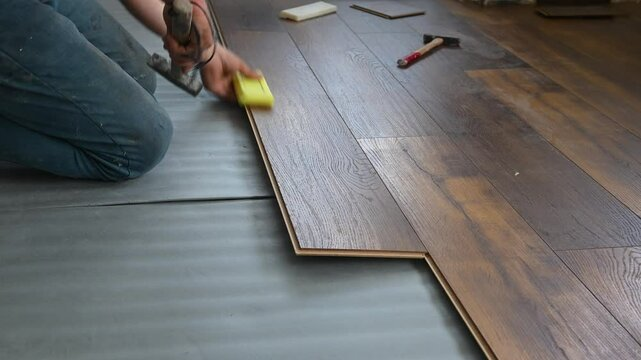A home’s flooring is more than just a surface to walk on—it sets the tone for the entire interior, contributes to comfort, and impacts both functionality and aesthetics. Modern homes demand flooring solutions that combine style, durability, and comfort. Proper floor installation ensures that homeowners enjoy long-lasting results while enhancing the overall design of their living spaces.
This guide explores how floor installation improves home comfort, boosts modern design, and adds value to properties. It also covers material options, installation methods, and tips for achieving a stylish and functional floor.
Contents
- 1 Why Floor Installation Matters
- 2 Popular Flooring Options
- 3 Steps to Ensure a Successful Floor Installation
- 4 How Floor Installation Enhances Modern Home Design
- 5 Benefits of Professional Floor Installation
- 6 Common Mistakes to Avoid During Floor Installation
- 7 Tips for Maintaining Your Floors
- 8 Future Trends in Floor Installation
- 9 Conclusion
Why Floor Installation Matters
Enhancing Home Comfort
The right flooring can dramatically improve comfort. Soft textures, smooth surfaces, and well-insulated floors create a cozy environment, making living spaces more enjoyable. When upgrading floors as part of a modern home redesign, homeowners often coordinate delivery of heavy décor and furnishings through trusted services like Furniture Shipping Pennsylvania to protect new surfaces and ensure smooth installation timelines.
Boosting Aesthetic Appeal
Flooring is a foundational element of interior design. A high-quality floor installation complements furniture, color schemes, and lighting, creating a cohesive and visually pleasing home.
Increasing Property Value
Homes with professionally installed floors often command higher resale value. Modern, durable floors are an attractive feature for potential buyers, making floor installation an investment in long-term value.
Improving Safety and Durability
Proper installation reduces risks of warping, slipping, and uneven surfaces. Durable flooring materials withstand daily wear, ensuring safety and long-lasting performance.
Popular Flooring Options
Hardwood Flooring
Hardwood floors offer timeless elegance and durability. They are ideal for living rooms, bedrooms, and dining areas.
Advantages of Hardwood Floors
- Long-lasting with proper care
- Can be refinished multiple times
- Adds warmth and luxury to interiors
Considerations
- Requires regular maintenance
- Sensitive to moisture
Laminate Flooring
Laminate is a cost-effective alternative to hardwood with a wide range of designs. It mimics natural wood or stone while offering durability.
Advantages of Laminate Floors
- Scratch and stain resistant
- Easy to clean
- Affordable and versatile
Considerations
- Not ideal for wet areas
- Cannot be refinished like hardwood
Vinyl Flooring
Vinyl floors provide comfort, water resistance, and a variety of design options. It’s popular in kitchens, bathrooms, and high-traffic areas.
Advantages of Vinyl Floors
- Water-resistant and easy to maintain
- Comfortable underfoot
- Wide selection of styles
Considerations
- Can be less durable than hardwood
- May dent under heavy furniture
Tile Flooring
Tile is a versatile and durable option, often used in bathrooms, kitchens, and outdoor spaces. It’s available in ceramic, porcelain, and natural stone.
Advantages of Tile Floors
- Highly durable and water-resistant
- Easy to clean
- Wide range of textures and colors
Considerations
- Cold underfoot without underfloor heating
- Can be slippery if wet
Carpet Flooring
Carpets add softness and warmth, ideal for bedrooms and living rooms where comfort is a priority.
Advantages of Carpet Floors
- Soft and comfortable
- Provides insulation
- Reduces noise
Considerations
- Requires regular cleaning
- May stain easily
Steps to Ensure a Successful Floor Installation
Choose the Right Material
Selecting flooring that fits your lifestyle, budget, and design goals is the first step. Consider durability, maintenance, and aesthetic appeal.
Prepare the Subfloor
A clean, level, and dry subfloor is essential for smooth and long-lasting floor installation.
Measure and Plan
Accurate measurements prevent material wastage and ensure the flooring fits perfectly in every room.
Professional Installation
Hiring experienced installers guarantees proper techniques, including secure fastening, Finishing Touches
Add baseboards, transitions, and protective coatings to enhance durability and aesthetics.
How Floor Installation Enhances Modern Home Design
Seamless Integration With Interiors
Modern flooring blends effortlessly with furniture, wall colors, and décor. Minimalist designs and neutral tones create a cohesive and stylish look.
Open and Spacious Feel
Light-colored flooring or wide planks can make rooms feel larger, enhancing the sense of space and openness.
Stylish Patterns and Textures
Innovative installation patterns, such as herringbone or chevron, add visual interest without overwhelming the room.
Functional Zones
Different flooring materials can define separate areas in open-concept homes, like combining hardwood in living areas and tile in kitchens.
Benefits of Professional Floor Installation
Long-Term Durability
Expert installation ensures floors are level, secure, and built to last, reducing the need for repairs or replacements.
Improved Comfort
Professionally installed floors are even, insulated, and free of gaps, enhancing comfort underfoot.
Reduced Maintenance
Proper installation prevents common issues such as warping, buckling, or squeaking, saving time and effort in maintenance.
Enhanced Home Value
High-quality floors installed correctly add both visual appeal and financial value to your property.
Common Mistakes to Avoid During Floor Installation
Poor Material Selection
Choosing flooring that does not suit the room’s purpose or lifestyle can reduce durability and functionality.
Skipping Subfloor Preparation
An uneven or dirty subfloor can cause long-term problems, including squeaking, gaps, and damage.
DIY Without Experience
Improper installation may result in misaligned planks, uneven surfaces, or damage to materials.
Ignoring Maintenance Requirements
Even durable flooring needs proper cleaning and care to maintain its look and lifespan.
Tips for Maintaining Your Floors
Regular Cleaning
Sweep, vacuum, or mop depending on the material to remove dirt and prevent damage.
Protective Measures
Use mats, rugs, and furniture pads to reduce wear and tear.
Timely Repairs
Address scratches, dents, or water damage promptly to maintain floor quality.
Follow Manufacturer Guidelines
Each material has specific care instructions to ensure longevity and appearance.
Future Trends in Floor Installation
Eco-Friendly Materials
Sustainable wood, recycled tiles, and low-VOC materials are increasingly popular for environmentally conscious homeowners.
Smart Flooring Solutions
Integrated heating, anti-slip coatings, and modular designs enhance comfort and safety.
Mixed Material Design
Combining wood, tile, and vinyl in creative ways creates functional and stylish spaces.
Bold Patterns and Colors
Geometric designs, contrasting tones, and textured finishes make floors a design statement.
Conclusion
Proper floor installation is essential for both comfort and modern home design. From material selection to professional installation and finishing touches, every step contributes to long-lasting, visually appealing results.
Investing in high-quality flooring not only enhances daily living but also increases property value, improves safety, and reflects your personal style. Whether you choose hardwood, tile, vinyl, laminate, or carpet, professional installation ensures that your floors remain durable, functional, and beautiful for years to come.
With thoughtful planning and expert execution, floor installation transforms homes into comfortable, modern, and inviting spaces that homeowners can enjoy for a lifetime.


